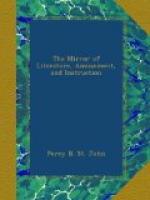LINES WRITTEN ON VISITING A SCENE IN ARGYLESHIRE.
At the silence of twilight’s contemplative
hour,
I have mused in a sorrowful
mood,
On the wind-shaken weeds that embosom
the bower,
Where the home of my forefathers
stood.
All ruin’d and wild is their roofless
abode,
And lonely the dark raven’s sheltering
tree:
And travell’d by few is the grass-cover’d
road,
Where the hunter of deer and the warrior
trode
To his hills that encircle
the sea.
Yet wandering I found on my ruinous walk,
By the dial-stone aged and
green,
One rose of the wilderness left on its
stalk,
To mark where a garden had
been.
Like a brotherless hermit, the last of
its race,
All wild in the silence of
nature, it drew,
From each wandering sun-beam, a lonely
embrace
For the night-weed and thorn overshadow’d
the place,
Where the flower of my forefathers
grew.
Sweet bud of the wilderness! emblem of
all
That remains in this desolate
heart!
The fabric of bliss to its centre may
fall,
But patience shall never depart!
Though the wilds of enchantment, all vernal
and bright,
In the days of delusion by
fancy combined
With the vanishing phantoms of love and
delight,
Abandon my soul, like a dream of the night,
And leave but a desert behind.
Be hush’d, my dark spirit!
For wisdom condemns
When the faint and the feeble
deplore;
Be strong as the rock of the ocean that
stems
A thousand wild waves on the
shore!
Through the perils of chance, and the
scowl of disdain,
May thy front be unalter’d,
thy courage elate!
Yea! even the name I have worshipp’d
in vain
Shall awake not the sigh of remembrance
again:
To bear is to conquer our
fate.
Of a similar description are his “Lines on revisiting a Scottish River."[6]
[6] See MIRROR, No. 257.
Mr. Campbell contributes but little to the pages of the New Monthly Magazine: still, what he writes is excellent, and as we uniformly transfer his pieces to the Mirror, we need not recapitulate them. The fame of Campbell, however, rests on his early productions, which, though not numerous, are so correct, and have been so fastidiously revised, that while they remain as standards of purity in the English tongue, they sufficiently explain why their author’s compositions are so limited in number, “since he who wrote so correctly could not be expected to write much.” His Poetical pieces have lately been collected, and published in two elegant library volumes, with a portrait esteemed as an extremely good likeness.




